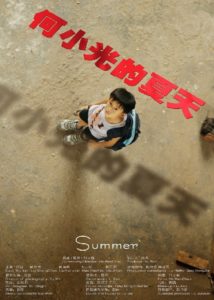Sweet Eighteen
甜蜜18岁
China, 2012, colour, 2.35:1, 88 mins.
Director: He Wenchao 何文超.
Rating: 5/10.
Offbeat portrait of a teenage lesbian crush marks a promising directorial debut.
Hunan province, central China, the present day. In a town by the Xiang river lives 18-year-old He Nan (Zhou Wenyi) and her mother Zhang Lan (Zheng Shuang), a former Chinese Opera singer originally from northeast China. The tomboyish He Nan is an introvert and a dreamer, never happier than when painting on her own, though she does have a casual boyfriend, Li Cong (Teng Fei), who is her same age. After He Nan sees her mother’s lover, Lin Guo (Liu Qiancheng), with a bargirl, she tells her mother she’s being two-timed. One day, after an argument started by He Nan, Lin Guo walks out on Zhang Lan, taking her money with him. Later, Zhang Lan falls downstairs while drunk and ends up in hospital in a coma. Abandoning her dream of going to the Central Academy of Fine Arts, and in need of help, He Nan goes in search of the bargirl, Xia Hong (Qi Qi), whom she discovers is pregnant by Lin Guo, who fled after leaving her RMB20,000. The two women become friends – and more.
REVIEW
Sweet Eighteen 甜蜜18岁 is either a film that takes a long time to clear its throat or a deliberate game of boxes within boxes. Labelled with a generic title that sounds like any number of first-love Asian movies, it starts as a lonely-teen portrait, morphs into a family drama and then, over halfway through at the 50-minute point, finally comes out of the  closet as a lesbian romance. This first feature by He Wenchao 何文超, 29, a Central Academy of Drama graduate with two shorts under her belt – It’s Your Turn 下一个 (2007) and graduation film Summer 何小光的夏天 (2009, see poster, left) – has difficulty establishing a consistent tone and is fairly superficial as a portrait of (unhappy) gay love. But it has enough interesting elements to pique interest in what He will do next.
closet as a lesbian romance. This first feature by He Wenchao 何文超, 29, a Central Academy of Drama graduate with two shorts under her belt – It’s Your Turn 下一个 (2007) and graduation film Summer 何小光的夏天 (2009, see poster, left) – has difficulty establishing a consistent tone and is fairly superficial as a portrait of (unhappy) gay love. But it has enough interesting elements to pique interest in what He will do next.
The film is strongest on the acting side, with He giving her actors plenty of latitude. She draws a touching performance from raw newcomer Zhou Wenyi 周文奕 as the teenager who has dreams beyond her hometown and en route confims her own sexuality. It’s no surprise to find that He herself has a parallel career as an actress – with supporting roles in films including the fine rural dramas Huaoyao Bride in Shangri-La 花腰新娘 (2005) and My Career As a Teacher 我的教师生涯 (2007), as well as in the 2010 TV drama Mou’s Manor 牟氏庄园 – as Eighteen is primarily a movie about feelings rather than pure plot. The latter is pretty generic, and rather bumpily developed; where the film scores is in its sense of atmosphere, with the unnamed riverside town a kind of emotional melting-pot for two very different women thrown together by a man’s betrayal.
Zhou’s low-key playing of the crop-haired tomboy is nicely contrasted by the playing of Qi Qi 祁琪 as the cool, practical bargirl for whom the teenager’s crush is not the be-all-and-end-all of her world. However, as the mother who used to be an opera performer, TV actress Zheng Shuang 郑爽 is too full-on, while Teng Fei 滕飞 is just standard good-looking as the boyfriend who’s flogging a dead horse.
On the technical side, He has surrounded herself with proven talent. The freewheeling cinematography by d.p. Xu Wei 徐伟 (My Career As a Teacher; Esquire Runway 时尚先生, 2008) conveys a natural feel for the town’s sweaty heat of summer, while the frequently fretted score by folk-rock singer-composer Dou Wei 窦唯 eschews the normal first-love cliches.
CREDITS
Presented by Hainan Xianliao (CN). Produced by Hainan Xianliao (CN).
Script: He Wenchao. Photography: Xu Wei. Editing: He Wenchao. Music: Dou Wei. Art direction: Peng Shaoying, Fang Shulin. Costume design: Xu Jianshu [Lawrence Xu]. Sound: Wang Changrui.
Cast: Zhou Wenyi (He Na), Qi Qi (Xia Hong), Teng Fei (Li Cong), Zheng Shuang (Zhang Lan, He Na’s mother), Yang Tao (Zhang Qian), Liu Qiancheng (Lin Guo), Jiang Zhonghua (Li Rongping).
Premiere: Shanghai Film Festival (Asian New Talent Competition), 21 Jun 2012.
Release: China, 19 Apr 2013.
(Review originally published on Film Business Asia, 8 Jul 2012.)
